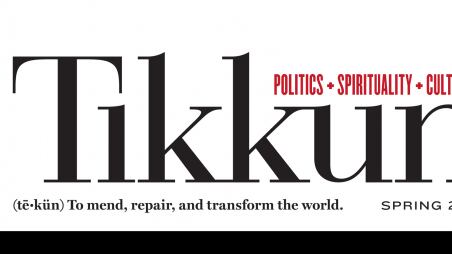It is so very difficult, indeed utterly unbearable, to sit silently by while Jews, and now the general religious and secular communities, completely misuse and distort the term tikkun olam—certainly not intentionally or out of any malice, but rather out of ignorance in the pursuit of virtuous goals and principles which may be applicable to general society and civilization but which have tragically become a poor substitute for authentic religious observance.
So says Grand Rabbi Y. A. Korff, Rebbe of the Zhvil-Mezbuz Hasidic sect.

While I feel his pain, he is a bit late to this party. The religious left has been making the same arguments for years. Korff quotes Rabbi Jill Jacobs’ critique of the overly broad use of the term tikkun olam—in its present incarnation it can mean anything or nothing.
Jacobs, however, is not alone. Rabbis, scholars, and activists on the progressive end of the political spectrum have been pointing out the misuse of this term for a while.
In the 2008 collection of essays Righteous Indignation—in which a good many of the rabbis, scholars, and activists on the left are represented—Rabbi Dr. Jane Kanarek writes that “the term tikkun olam itself has become a cliché, used so often that it offers little real guidance for social justice efforts.” In the first issue of Tikkun, a magazine whose name and logo pointed to the then-growing movement to do social justice work with a Jewish frame, Rabbi Daniel Landes wrote:
Tikkun is manifested both on the macro level—the ultimate repair of the tear—and on the micro—the doing of concrete acts that lead to the ultimate repair. Tikkun has two dialectically related models: the Kabbalistic, the origin of the term and theory; and the Halakhic, which contains the behavioral substance molded and defined by the Kabbalistic.
All this is to say that the door that the Grand Rabbi is bursting through has been wide open for years. The issue I have with Korf’s argument is that, in the end, it’s a bait and switch. It is one thing to say that the term tikkun olam, in its historical and traditional sense, has been misused or misunderstood by a large majority of Jews. This is something that I, and many others with similar views, would mostly agree with. It is an entirely different thing to say that it is “a ‘pseudo-religion,’ ‘social action fetishism’ and a ‘vulgar misuse and distortion by assimilationists.’” Or that “‘the current [promiscuous] usage of this term represents a category mistake, is a blatant example of conversion by redefinition, and constitutes a paradigmatic example of the reductionist fallacy’ which is merely ‘liberation theology without the theology.’”
Rabbi Jill Jacobs, cited by Korf as a critic of the term tikkun olam, is the executive director of “Tru’ah: The Rabbinic Call for Human Rights.” She has written a book steeped in traditional learning, Where Justice Dwells, which, as its subtitle suggests, “Pursu[es] Social Justice Through Jewish Law and Tradition.” In her book, Jacobs critiques the overbroad usage of the term tikkun olam—and shows that the tradition has a much more nuanced vocabulary for the work of social and economic justice. In my own book, Justice in the City: An Argument from the Sources of Rabbinic Judaism, the phrase tikkun olam does not appear.
The argument that Jews are obligated to work towards a more just world is not dependent on a single phrase, it is dependent on a consistent and coherent reading of an unbroken tradition that starts with Isaiah and is interpreted and expanded by the rabbis of Late Antiquity, the Middle Ages, and Modernity. At times this vision was narrower (only encompassing the Jewish community), but just as often the vision was broad and all encompassing. Consider these two statements. “We are obligated to support the gentile poor with the Jewish poor.” “All who can protest against something wrong that is being done… in the whole world, is accountable together with all citizens of the world.” These are Mishnaic and Talmudic statements, not the writings of contemporary rabbis.
The rabbis of this and the last century from many different streams of Judaism have cogently written about the importance of unions, the permissibility of strikes, the ethical problems of the death penalty, and the importance of ameliorating poverty. I would wholeheartedly embrace Korff’s statement that, “for Jews who truly do want to engage in Tikkun Olam, the only honest and authentic Jewish way to do that is to encourage observance of the Torah across the entire spectrum of the Jewish Community,” since I firmly believe that the laws of treating workers in the sixth and seventh chapters of Baba Metzia, or the laws of poverty relief in the last chapter of Mishnah Peah and the first chapter of Baba Bathra, are as important as the laws of cooking on Shabbat in the third chapter of Shabbat.
There is a burgeoning library of books and articles on social justice written by people who are steeped in learning and committed to observant Jewish living of many stripes—and equally committed, because of their learning and practice, to create a more just world. To sit on the sidelines and bemoan the vulgarity of the hoi polloi without reading the literary products of the last two decades of learning and scholarship is an unfortunate exercise in solipsistic name-calling.





